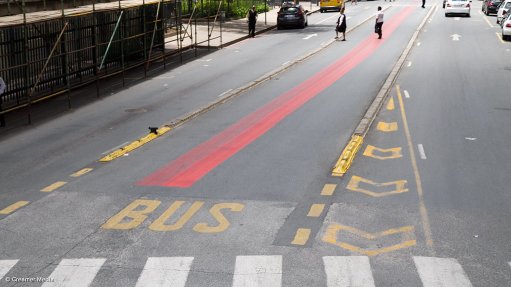
Photo by: Duane Daws
Metropolitans have consistently underspent their public transport infrastructure grants nearly every year since 2010, Transport Minister Dipuo Peters has revealed in a Parliamentary reply.
The Department of Transport’s (DoT’s) effort to roll out quality public transport networks to South Africans had seemingly been hindered by the metropolitan municipalities’ failure to spend the allocated Public Transport Infrastructure and Systems (PTIS) grant.
According to National Treasury, the PTIS grant was the main funding source for the bus rapid transit (BRT) systems, and other public transport systems, in Johannesburg, Cape Town and other cities.
The department had transferred R3.4-billion to Buffalo City, Nelson Mandela Bay, Mangaung, Ekurhuleni, eThekwini and the cities of Johannesburg, Tshwane and Cape Town metropolitans, between July 2010 and June 2011, but only R2.8-billion was spent.
The following year, only R2.8-billion of the allocated R4.2-billion had been spent.
The period from July 2012 to June 2013 saw the metropolitans playing catch-up, overshooting the overall budget of R4.1-billion by R162-million, before failing to spend the allocated budget during the year to June 2014, with only about R2-billion of the R3.4-billion budget spent on transport infrastructure.
Buffalo City’s 2008 draft operational plan for integrated public transport services had been delayed for over four years on the back of administrative delays and a legal challenge regarding its procurement of a consortium to do the detailed planning and design of the city’s transport system.
“Currently, the city is in discussions with National Treasury with regard to appealing the High Court decision to award the tender to the second placed bidder,” Peters said in a written reply to a Parliamentary question by the Democratic Alliance.
The Minister said all plans for the “full network” have been completed and would be implemented by November, with buses already on order.
In Ekurhuleni, the Phase 1a services for a planned public transport system was expected to kick off in 2016, with the detailed design plans for bus link between Tembisa and Kempton Park completed and busway construction under way in Tembisa.
Meanwhile, the DoT had expressed its dissatisfaction at the eThekwini metropolitan’s performance after taking seven years to roll out its own BRT plans, particularly in light of consistent underspending.
However, the city had committed to “speed-up” plans during the 2014/15 financial year, with comprehensive “wall-to-wall” network plans for four phases and nine corridors completed.
Construction on the first corridor from Bridge City to Pinetown had started.
Planning for Phase 2 of the City of Cape Town’s BRT services – Phase 1 already carried about 50 000 average weekday passenger trips – between the south east and Wynburg/Claremont was under way.
Phase 1 had trunk services from Atlantis to the central business district (CBD), while services covering Tableview, Du Noon and the N2 Express service between Khayelitsha/Mitchells Plain and the CBD had also gotten under way.